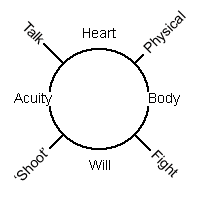Campaign:End-World: Difference between revisions
1d4chan>Oinoloth mNo edit summary |
m (39 revisions imported) |
||
| (10 intermediate revisions by 2 users not shown) | |||
| Line 4: | Line 4: | ||
''' | '''TOOT TOOT YOU ON THE PAIN TRAIN NOW SAI''' | ||
| Line 12: | Line 12: | ||
[[The Dark Tower]] by way of [[Dogs in the Vineyard]]. For now the game channel is #Mid-World on suptg. | [[The Dark Tower]] by way of [[Dogs in the Vineyard]]. For now the game channel is #Mid-World on suptg. | ||
[[ | [[Campaign:End-World/Blank Charsheet|Here is a blank charsheet template.]] | ||
'''Characters''' | '''Characters''' | ||
*Tibbs: [ | *Tibbs: [[Campaign:End-World/LaRoux | Josef La Roux]], Gunslinger's daughter. | ||
*Caes: [ | *Caes: [[Campaign:End-World/Raymond | Raymond Tucker]], Shawshank escapee. | ||
*CC: [ | *CC: [[Campaign:End-World/Alan | Alan Cohen]], failed Gunslinger. | ||
*Ruler: [ | *Ruler: [[Campaign:End-World/Uta | Uta of River Crossing]], escaped Breaker. | ||
[ | [https://docs.google.com/open?id=0B9iXY4btM829MHFnN3hQMDRBZkU ''Song of the Tower'', the first book of the game can be seen here.] | ||
[http://freetexthost.com/pt4fwde560 An ongoing log of the current arc can be seen here.] | |||
[[Wiki.Campaign:End-World/Concordance | The End-World Concordance of people, places and things encountered by our ka-tet.]] | |||
---- | ---- | ||
| Line 203: | Line 206: | ||
*Have your character leave the scene and spend some time alone. Only choose this one if nobody else launches a follow-up conflict. | *Have your character leave the scene and spend some time alone. Only choose this one if nobody else launches a follow-up conflict. | ||
==== Long-term Fallout ==== | ==== Long-term or Injured Fallout ==== | ||
*Subtract 1 from one of your character's Stats. | *Subtract 1 from one of your character's Stats. | ||
*Take a new trait at 1d4. | *Take a new trait at 1d4. | ||
Latest revision as of 15:35, 25 June 2023

TOOT TOOT YOU ON THE PAIN TRAIN NOW SAI
The Dark Tower by way of Dogs in the Vineyard. For now the game channel is #Mid-World on suptg.
Here is a blank charsheet template.
Characters
- Tibbs: Josef La Roux, Gunslinger's daughter.
- Caes: Raymond Tucker, Shawshank escapee.
- CC: Alan Cohen, failed Gunslinger.
- Ruler: Uta of River Crossing, escaped Breaker.
Song of the Tower, the first book of the game can be seen here.
An ongoing log of the current arc can be seen here.
The End-World Concordance of people, places and things encountered by our ka-tet.
Part I: Character Generation[edit]
First Step: Background[edit]
Pick one of the following:
- Well-Rounded
17d6 Stat Dice
1d4 4d6 2d8 Trait Dice
4d6 2d8 Relationship Dice
- Strong History
13d6 Stat Dice
3d6 4d8 3d10 Trait Dice
1d4 3d6 2d8 Relationship Dice
- Complicated History
15d6 Stat Dice
4d4 2d6 2d10 Trait Dice
5d6 2d8 Relationship Dice
- Strong Community
13d6 Stat Dice
1d4 3d6 2d8 Trait Dice
4d6 4d8 3d10 Relationship Dice
- Complicated Community
15d6 Stat Dice
6d6 2d8 Trait Dice
4d4 2d6 2d8 2d10 Relationship Dice
Second Step: Stats[edit]
Divide your Stat Dice among the four stats: Acuity, Body, Heart, and Will.
The minimum for each Stat is 2d6; there’s no maximum.
- Acuity: More dice in Acuity means a character who’s perceptive, alert, educated, clever, savvy or well-read.
- Body: More dice in Body means a character who’s big, healthy, strong, wiry, muscular, tall, graceful, quick, or steady.
- Heart: More dice in Heart means a character who’s compassionate, attractive, charming, gentle, courageous, enduring, faithful, or likable.
- Will: More dice in Will means a character who’s tenacious, aggressive, confident, unflinching, strong-willed, or unshakable.
You won’t usually roll any Stat alone. Usually you roll them in pairs:
- If your character’s speaking, roll Acuity and Heart
- If your character’s doing something physical but not fighting, roll Body and Heart
- If your character’s fighting hand to hand, roll Body and Will
- If your character’s gun fighting, roll Acuity and Will
Third Step: Traits[edit]
Traits are personal characteristics like a biting tongue, a lightning draw, or the double-edged sword of the Touch. Traits are not all "special powers" — weaknesses or character flaws can be just as important as skills or craft.
Note that d4 traits aren't necessarily indicative of aptitude — “I’m a good shot 2d4” means that yes, your character’s a good shot, but when guns come out, your character’s life gets even more complicated than usual.
Divide your Trait Dice among whatever traits you care to define. i.e. "Can do the Howken 2d6", "Telekinetic Breaker 2d10", "Heroin Junkie 2d8", etc.
"Warrior of the White" is a recommended trait for Gunslingers.
If you can't think of any Traits to start with, start with "I'm a good shot"; add one based on where and how your character learned how to shoot; then add one unrelated but opposed like "I'm a good cook" or "I'm well-learned".
Remember that no one likes a stewing-mary.
Fourth Step: Relationships[edit]
These are people that you know from your past or present that have some impact on you. You can call on these dice by invoking a relationship in a way that is significant to the moment. Eddie Dean's brother Henry is a monumental figure in his life, and someone he invokes frequently — if not always willingly — in times of stress.
Divide some of your Relationship Dice among other PCs or whatever NPCs you care to define. Don't create very many, and leave most of the dice unassigned. This way, you can call up relationships from your past or form a bond with someone in the present. Unlike the traditional DitV approach of knowing a lot of people, consider taking dice in different aspects of a relationship. In times of stress Mean Henry comes to the surface, but in times of joy or exultation the loving brother emerges. Roland often remembers Cort's bludgeoning and badgering, but also his philosophies and wisdom.
Fifth Step: Belongings[edit]
Freely define whatever belongings you care to define for your character. A Gunslinger generally owns nothing but a pair of shooting irons, a horse, and the clothes on his back, though one who expects to be travelling will likely have a small pack of useful supplies. Other possessions may be defined as needed, with dice according to the following:
Normal: 1d6 Big: 1d8 High Quality: 2d6 Big & High Quality: 2d8 Shit: 1d4
All guns receive an extra 1d4 die, so a normal pistol would be 1d4+1d6, a normal rifle would be 1d4+1d8, a runout would be 1d4+1d4, etc.
Something that's big and shit is still just 1d4.
Sixth and Final Step: Accomplishment[edit]
Define something that you hoped your character accomplished during their entry into the shadow of ka. This will be played out as the stakes of a conflict.
Part II: Playing the Game[edit]
Helping Others[edit]
If you and a friend are in a conflict together, you can help one another. It works like this:
On your friend’s Go, you can give one of your dice to your friend’s Raise. You have to have your character do something that would a) clearly and directly contribute to your friend’s character’s action, and b) be obviously something your character could do, given everything else going on. If anyone objects that your character’s too busy or in the wrong part of the scene, you should graciously withdraw. Given that everybody thinks it’s reasonable, though, just slide one of your dice over to go with your friend’s.
On someone else’s Go, you can give one of your dice to your friend’s See. Again, you have to have your character do something both clearly helpful and clearly possible, and again if anyone objects, don’t insist.
Either way, however, you’ve spent the die, and moreover, you’ve borrowed against your own next Raise. On your next Go, Raise with only one die.
You can’t help two people between your Goes. If you could, you’d have to Raise with no dice, and that doesn’t make any sense.
When you give a die to a friend for a See, it doesn’t count against her for Fallout. In other words, if your friend is able to See with one die plus yours, that’s a Reversal; with two dice plus yours, that’s a Block or Dodge; with three dice plus yours, that’s Taking the Blow for three dice of Fallout.
Ceremony: The Voice of the White[edit]
Sorcerers, demons, the possessed, and anyone else cannot help but cower before someone possessed of the Voice of the White. That means that when your character’s in conflict with one of those sorts of opponents, you can use ceremony to See and Raise! Your character can perform an entire ceremony, including many ceremonial elements, as a single See or Raise, or each See and Raise can be a single element of ceremony. Choose whichever better serves the pace of the conflict.
In addition, the elements of ceremony that your character uses determines the Fallout dice that your character’s opponent receives when Taking the Blow. Ceremony is like a weapon, in that way.
Rituals and Litanies[edit]
- Voice of the White d8s
- Face of my Father d6s
- Aim with my Heart d6s
- Sign of the Eld d4s
- Cloak of Coldness d8s
- Manni Bobs d8s
If you’re creating a multiple-element ceremony as a single Raise, inflict the highest die-size Fallout of all the elements you’re including. If, for instance, your ceremony includes Face of my Father, Aim with my Heart, and Cloak of Coldness, it inflicts d8s for Fallout.
Strictly, bringing ceremony into a conflict is not escalating. You don’t get to roll new dice — unless you’ve got a Trait or Belonging that now applies. No, ceremony is useful only because it lets you Raise against demons and sorcerers on their own terms.
Fallout[edit]
Fallout Dice[edit]
- Non-physical: d4s or ceremonial
- Physical: d6s
- Weapon: d8s
- Gunshot: d10s
Fallout Roll[edit]
- Any 1s: Experience
- 2-7: Short-term.
- 8-11: 1 Long term.
- 12+: 2 Long term.
- 12-15: Injured.
- 16-19: Badly Injured.
- 20: Dying.
Things' Dice[edit]
- Normal: 1d6
- Big: 1d8
- High Quality: 2d6
- Big & High Quality: 2d8
- Crap: 1d4
- Guns: +1d4 Reference
Short-term Fallout[edit]
- Subtract 1 from one of your character's Stats for your next conflict.
- Take a new trait rated 1d4 for your next conflict.
- Change the dice of one of your character's Relationships to d4s for your next conflict.
- Have your character leave the scene and spend some time alone. Only choose this one if nobody else launches a follow-up conflict.
Long-term or Injured Fallout[edit]
- Subtract 1 from one of your character's Stats.
- Take a new trait at 1d4.
- Take a new relationship at 1d4.
- Add 1d to an existing d4 trait or relationship.
- Subtract 1d from an existing d6+ trait or relationship.
- Change the die size of an existing trait or relationship to d4.
- Erase a Belonging from your character's sheet .
Experience Fallout[edit]
- Add 1 to one of your Stats.
- Create a new Trait at 1d6.
- Add or subtract 1 die from an existing Trait.
- Change the d-size of an existing Trait.
- Create a new Relationship at 1d6.
- Add or subtract 1 die from an existing Relationship.
- Change the d-size of an existing Relationship.
- Write a Belonging on your character sheet and give it its usual dice.
